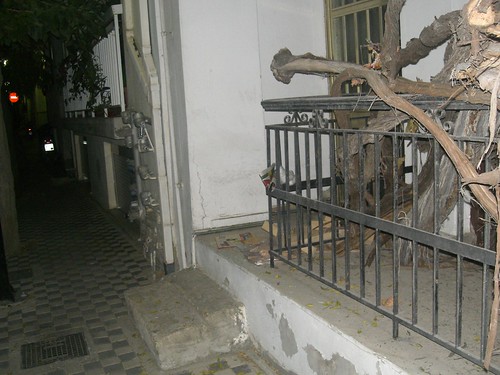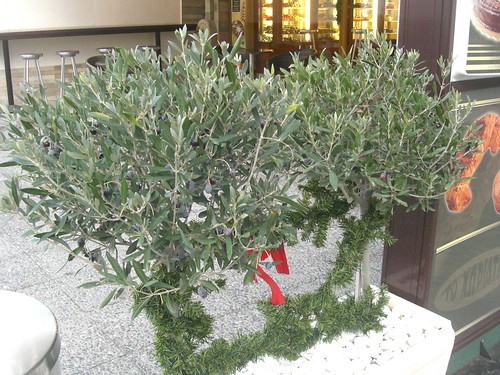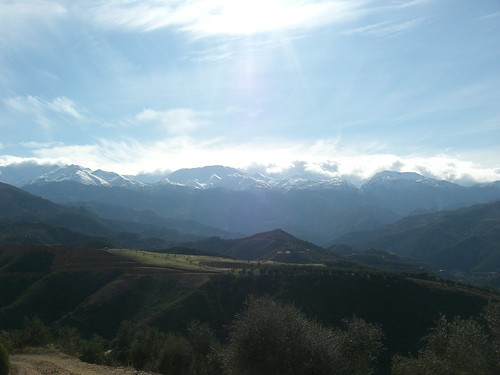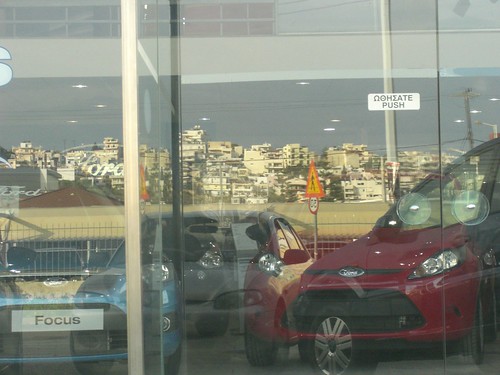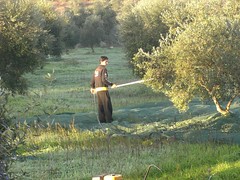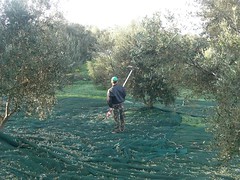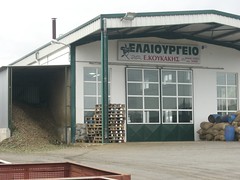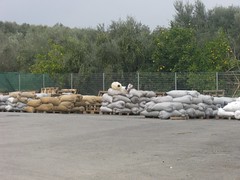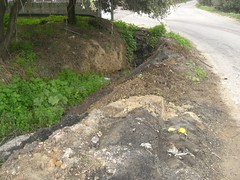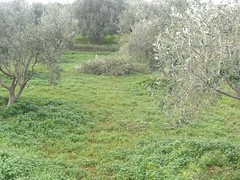It had been a while since Ira had been to a cafe. It was at Genie's request that they go out to celebrate - or commiserate - their new work contract. The package presented to them was in general terms quite satisfactory, despite the low pay rate: part-time, flexible hours, six weeks paid leave, and all the regular bonuses that Greek employers are expected to provide to their workers. It had all the elements to make it sound like a good offer, but there was only once catch: the salary was based solely on the basic pay rate, without taking into account the fourteen years Ira had already spent in the same job doing the same work; the new contract simply wiped them off her record. They were being paid the salary of a freshman just out of college. Genie, already struggling on a single salary, had already reached her credit limit. Autumn had set in and the tourist season was over. There would be very few other opportunities to pick up more work for the rest of the year.
Ira had always regarded her pay packet as dispensable. As a newly-wed, she declared to her husband that if he wanted to save any money for a new car, an exotic holiday or home renovations, he could do it from his salary; she was going to spend all of hers. After years of living an independent frugal lifestyle, Ira wanted economic freedom, which in her case, meant that her salary was to be spent, not to be put away for a rainy day. Whatever money she brought into the house, which was usually during the winter season, she would use on living comfortably. She paid all the household bills and did the weekly supermarket shopping, in the parsimonious manner of her single days. If there was anything left over, she chose to spend it on the little luxuries in life that boosted one's morale in the dull winter gloom that overtook the island in the shorter days. She took the children to the cinema every now and then, bought her author's latest novel, maybe a few trinkets from the 1-euro shop for the children. The fancy clothes and accessories in the window displays never caught her eye; the consumer society she lived in annoyed her. She hardly ever complained of headaches, but when she returned from a trip into the town centre, it was enough to bring one on. Her eyes hurt at the sights of the flamboyant lifestyles of her compatriots: obese women wearing low-cut jeans that spilled out of their flabby stomachs and fleshy thighs, their cracked scratchy soles sporting delicate swaroski diamante-studded strappy sandals, young people seemingly talking to no one, a hands-free clipped to their ears. She sometimes wished she could stay in the village and pay someone to run all those errands for her, to avoid seeing the worst in the people she lived amongst.
The beach still sported signs of being used: the deckchairs were still arranged in tidy rows in front of the beach bar, and there were quite a few people enjoying the late autumn sunshine. It was still warm enough to swim and sit near the sea, which is why Genie suggested the beach bar. They were both wearing long-sleeved cotton blouses and jeans, typical clothing for the season, but not the most appropriate attire for lounging around on a deckchair.
The cafe was built in the typical manner of the Mediterranean island beach bars. As it operated during the winter months, plastic transparent sheeting had been rolled down to keep the chilly evening air away from the indoor section and heaters had been placed in the central areas of the seating area. As it was a weekday morning, Ira was not surprised to find the cafe virtually empty, save one table where two women sat opposite each other, heads huddled together.
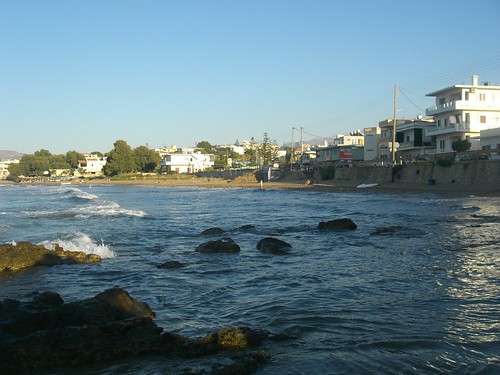
They entered the indoor dining area. "Choose a table and I'll be back in a tick." Genie wanted to use the restroom. Ira chose a table next to the plastic sheeting, with a postcard view of the sea: rolling frothy waves lapping the shoreline, northern European tourists enjoying the sun, toddlers digging up the sand. All this would be gone in a month from now with the last chartered flight out of the island. The beach bars would close down, the deckchairs would disappear, along with the tourists, not to be seen again for another five months. The table was next to the one where the other two women sat. They had chosen the best seat with the best view, slap bang in the middle of the row of tables by the windows, away from the noisy footpath-less road where the traffic was speeding along in both directions. As she pulled out the chair, she looked across at the women and smiled, the customary manner of acknowledging the presence of other people in close range of each other in the same room.
Ira wondered why she always seemed to head for the left-hand side of a table whenever she went out for a drink or a meal. The women looked up at her as she took a seat, only momentarily stopping their conversation to check out the new customers, quickly turning their faces towards each other to continue talking about whatever they were talking about before Ira had caught their attention. Genie had not yet returned from the ladies'. Ira lowered her gaze, so that she did not seem to be staring at the other women. She put her handbag on the chair beside her. Then she picked it up again, making herself stand out a little, like a fidgeting madwoman,and rummaged through it to find her cellphone. She was not expecting a call, nor did she want to make one. In fact, her mobile rang on average twice a week; only her husband called her. She left the phone on the table, and thought about where she should place her handbag again, estimating where Genie would most likely want to sit: probably in the chair opposite her where she would also have a view of the last of the summer suntanners. Ira sat on her own for a few minutes, her face still sporting the smile she had greeted the women with.
They paid no attention to her. Ira had a side view of the woman closest to her, who was rather overweight. Her hair had a glint of red shine to it; despite her age, her hair was pinned back with a fashionable hairpin, the kind that young girls like to sport on their youthful healthy locks, zirconias gleaming at one end in the shape of a daisy flower. This was in complete contrast to the other woman whose hair was short and grey. Her body and clothes matched her tired wrinkled looks, even though she did not look old, maybe in her early 40s. She was a bag of bones, hardly a layer of fat anywhere on her body, a fragile hand holding a glass of frappe coffee, her elbow resting on the table. She wore sunglasses, even though they were indoors. They were both dressed in black top to toe.
A peroxide blonde wide-hipped waitress, hips and tummy exposed over tracksuit pants and a tight pink lycra top came to take Ira's order. She was not carrying a menu card, which was not unusual; two women coming into a cafe at this hour could only be having something similar to what the other two women were having, coffee or fruit juice, something to keep their hands busy while they chatted about nothing in particular, something to pay for the time that they would be spending in the cafe. A drink at a cafe on a Mediterranean island is kind of like paying rent to the cafe owner for letting you enjoy a picturesque view from a prime location. Genie had asked Ira to order a frappe for her.
"A decaf
frappe,
metrio, no milk, and..."
Ira hesitated. She rarely visited such establishments, preferring her home-made coffee over any other. She was feeling uncomfortable; she didn't know the modern names of the cafe coffee varieties.
What was that coffee called, the cold version of a long cool
frappe that wasn't made with instant powder, and had a creamy frothy topping? She had been longing to have one of those coffees at a seaside cafe just like the one she was sitting at now, but whenever she had been anywhere near a place like this with her husband, she was always accompanied by her children. Long cool drinks cannot be imbibed in the relaxed manner warranted when there are two primary schoolers constantly attracting her attention.
"... a frey-chee-no?" She spoke softly, the syllable coming out spluttered, as she sensed a rising tone in her voice, a clear indication that she did not know how to ask for what she wanted. This was probably how her parents felt when they first emigrated, not when they ordered a restaurant meal (
did they ever go to a New Zealand restaurant, Ira wondered), but when they asked the grocer for simple things like tinned cornbeef (
kobif) or milk tokens (
milkadockas).
"And an espresso." The waitress repeated what she thought she heard. "Anything else?"
"
Elliniko," she replied, "not an espresso." The waitress did not even bat an eyelid; she probably thought Ira was a foreigner (she still retained a hint of foreignness in her Greek accent) and didn't know how to ask for a Greek coffee. Ira felt like a fraud for not trying to ask for that fredduccino or freddo cappucino, or whatever it was called, making it sound as though the waitress had misunderstood her, and not the other way around.
Whatever. Ira decided not to try asking again for an ice coffee, lest she expose more ignorance on her part of modern cafe parlance. Genie had returned, and sat where Ira had predicted she would. Ira still had a clear side view of the obese woman, and a full facial of the gaunt-faced one. The fat one now moved her chair and sat face to face with the thin one; her view of the sea was not obscured, but she would have to turn her head by ninety degrees to have a better view of it. Her rather large posterior faced Ira.
Genie took out her cigarettes. "So that's it, then?" she sighed, her voice bringing Ira back to her own preoccupations, forgetting about the women on the other table.
"I guess so. I'm not happy about it," she lied, "but I suppose it's better than being unemployed." Her last sentence was not a lie. Life on a Mediterranean island was tough during the winter. Most people worked seasonally all year round, doing very different work from one season to the other. The hotel owners would all be managing their olive fields in the winter, which could take them right up to the beginning of the next tourist season when the hotels opened up for business again. Ira and Genie would be employed on steady hours for the whole year round. Everyone thought that their job was perfect. They would not have to pick up the dole during their unemployed period, their hours were flexible, the pay was standardised. They never worked evenings and their work environment was pleasant. In the opinion of the townspeople, they had a very good job.
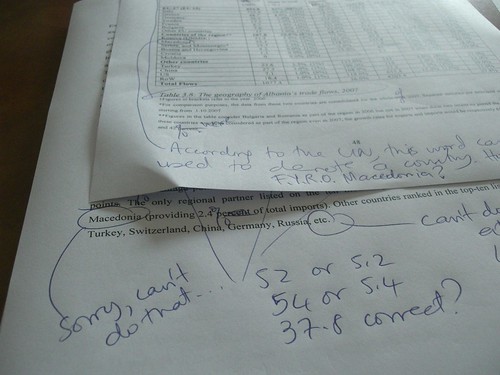
When people asked Ira what she did for a living, she would often reply 'cleaning lady.' And in fact her job did entail cleaning in a sense. She proofread and corrected other people's writing, re-wrote whole segments of theses written by science graduates, translated from Greek to English and English to Greek. She had even acted as an interpreter at a conference once. She was polishing other people's English skills, sweeping up their grammar, cleaning their spelling, decorating their vocabulary. She felt more comfortable explaining to her acquaintances that her job was similar to theirs, which was usually shop assistant, farm worker or cleaning lady. She felt it earned her more empathy from the local people, most of whom hadn't finished school, let alone earned a university degree.
"We're a scientific research centre, not an English school," her boss had pointed out in their meeting that morning. "We could do away with English lessons altogether, as most other research centres have already done." Ira was not perturbed by the thought that she could be out of a job; her husband made enough to keep the family. It was Genie who was in financial turmoil.
The fat woman stretched out her arm to the table to reach what looked like a fruit cocktail, her long manicured fingers swaddling the delicate glass. Ira's view of orange juice served at a cafe bar was based largely on the fact that her husband's orange groves were not profitable as the costs of maintenance and irrigation were higher than the money earned from them. The orange industry on the island was running at a loss, while tourists were paying three euro for a glass of freshly squeezed orange juice.
"You know you're better off than me," Genie continued. "You're married. Your husband can support you. I'm on my own, up to my ears in debt. There are times I can't even afford a bus ticket!" She offered Ira a cigarette, even though she knew that Ira didn't smoke; it was part of Genie's friendly generous character. Ira had always liked her, despite the completely different lifestyles they led. She lit her cigarette and inhaled. As she let out the smoke, she seemed to be relieving herself of the built up pressure she had been facing at the prospect of being jobless. "Does your husband ever expect you to help out in the household expenses, Ira?"
She knew about Genie's ex, how he left the unpaid bills on the bed, poured all his profits into his business, and went bankrupt, which, according to Genie, was the cause of their permanent separation. Meanwhile, Genie was always dressed in the latest fashion, sporting all the appropriate accessories to match, never cooked at home, and spent a fortune on telephone bills to her family abroad.
"I pay what I can." Ira did not like to admit that she paid everything. It would sound unbelievable. "I guess having a vegetable garden helps." The two women lived on different tangents of the same world. Ira's was all about orange and olive trees, an organised kitchen, a well-stocked deep-freeze, no takeouts, and a cheap taverna meal out only once in a while. She kept her thoughts to herself. The coffee session did not have the celebratory nature it was supposed to to have. Genie was in one of her moods, while Ira, as usual, looked unruffled.
The waitress came with the coffees. She placed them deftly on the table. "
Stin iyia sas." They both smiled.
"Hey, I thought you didn't like Greek coffee." Genie was quick to point out that one in her loud American accent. Genie had been working with her well over a decade; she only ordered hot instant coffee from the canteen at work, even in the summer, which most people found unusual.
"Isn't the view marvellous?" Ira decided to try out a new direction in the conversation, her voice sounding a fraction of decibel higher than Genie's. The women sitting opposite them seemed to have heard her, for they had raised their heads to look out the window, in search of what it was Ira had seen that looked noteworthy.
Ira brought the demi-tasse close to her lips, its smoky smell overtaking her sense of smell. It had been freshly brewed, the frothy layer was unbroken, the heat of the coffee drifting onto her hands as she held the cup. She took a small sip, feeling the powdery residue of the coffee on her tongue, as she reminded herself not to drink it too quickly, even though she liked her coffee hot. When she had first come to Greece, her Athenian cousin had taken her to a cafe, and ordered her a frappe. Despite the fact that it was the middle of winter, Ira had drunk it all within the space of a quarter of an hour, what she had been used to doing on a coffee break at work in New Zealand. Her cousin exclaimed in a horrified tone: "Well now that you've drunk it all, what are you going to do for the next two hours here?" Going out for a coffee in Greece was not the same as having a coffee during a work break.
Genie was harping on about her expenses. "There's DEH, OTE, and the water bill, they're pretty much standard every month. Hang on, there's my cellphone, that's standard, too. Take out food, bus fare, cabs, they're weekly. Then there's a wedding or baptism present every fortnight" - Genie mixed in much wider social circles than Ira, despite her single status - "and a meal out every Friday with the girls."
More unattached wannabe-married drop-outs, Ira thought. "Don't you go out with your family for a meal once a week, Ira? We always went out for dinner once a week in the US. It's so depressing staying indoors all the time, eating alone."
Ira felt sorry for her. She had been in the single position for many years, and knew how Genie must be feeling: tired of being alone, embittered about not getting any younger, wondering if there will ever be a Mr Right. "I know how you feel, and you should get out more. I'd hate to be cooped up in an apartment all alone every night." Most of all, she hated the thought of living in an apartment. She had lived a semi-privileged life, never having to live in a house without a panoramic view of the city. Even in the days when Ira was renting an apartment in the middle of town, her view of the sky had never been obscured. It was a priority for her on equal terms with price.
"At least you're not renting," Ira reminded her friend. Genie was lucky to own her own home. Her rich Greek American parents had gifted her an apartment near the sea - alas, it faced the sea - when she first met her ex. When the relationship ended, Genie ended up with a home and guilty feelings about moving back to the States after her parents' sacrifices. Ira found it difficult to relate to Genie's tirades regarding her financial turmoil. Her own home was acquired through the hard work of her husband and her own frugality, as they had built a house on top of his own family home without taking out a loan. An open-plan kitchen-cum-living room was where they spent their first night as newly-weds, adding to the basic construction when their savings permitted. As she listened to Genie's rants, she watched the blackrobed women from the corner of her eyes. The skinny one was waving her hands in the air, in a descriptive gesture to emphasise a point she was making, while the chubby lady was nodding her head in sympathy.
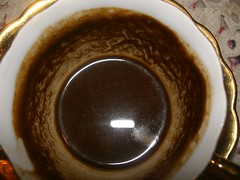
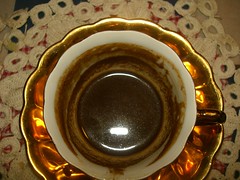
Ira had almost finished her Elliniko while Genie hadn't even reached half-way down the frappe glass. Ira felt it her duty to keep picking up the demi-tasse, even though it was practically empty. It gave her something to do with her hands. She noticed that the other women had not finished thier drinks, making her more conscious of her abnormal behaviour in an environment that she had never become familiar with in the way she thought she would when she first came to live on the island. Everyone she had met knew frequented cafes, everyone except herself that is, and she wondered at the time whether this would come in time for her, as a natural consequence of living in the place, or if she herself had to make an effort to be known amongst the circles of friends she had made from work to invite her out. For some reason, they never did. She had never worked out the answer to that riddle. Apart from feeling alone during the holiday and festive periods, it didn't really bother her; she loved being alone. Even now as a wife and mother, she recalled her quieter days with a hint of nostalgia.

Out of habit, Ira brought the demi-tasse to her lips. The muddy residue of the powdery coffee left a furry feeling on her tongue. She quickly withdrew the cup from her mouth and was about to set it on the saucer when she changed course mid-air. She swirled the coffee cup around a few times so that the coffee grounds were unsettled and had stained half the side of the cup a dirty brown to its mid-point. She proceeded to upturn the cup onto the saucer, the muddy mixture pouring haphazardly over the saucer. She had never done this before, and was glad that the coffee grounds did not spill over the saucer and dirty the tablecloth, because she would have looked ridiculous.
"Hey, I didn't know you read coffee cups!" Genie laughed. "What can you see in it?"
When Ira did drink Greek coffee, which was very rarely, she usually let the coffee grounds settle at the bottom of the cup, so that it would make it easier to dispose of them. They often stuck to the dish rag, which needed to be rinsed a few times to make sure that they were flushed away. This time, Ira picked up the cup carefully, uprighting it so that the patterns made by the coffee grounds were not spoiled, and could make a convincing prediction.
*** *** ***
Genie had always been a little wary of her colleague. Ira had the look of a submissive wife, but she could be totally unpredictable at times. When Ira had gotten married, she didn't invite anyone from the office. Her colleagues only found out when she asked for leave to take a belated honeymoon. She kept her private life to herself, but she had a very welcoming nature. Every week, she baked a cake or some biscuits and shared them among the office staff. Her husband, a rather attractive man who looked more Scandinavian than Cretan, seemed the exact opposite of Ira: his manners were refined, his outlook sensitive, his dress sense fashionable, which is why Genie was surprised to learn that he was a taxi driver. Being a regular taxi customer, Genie wondered which taxi rank he frequented, as she had never had the pleasure of being chauffered by him.
For all her plain looks, Genie knew that Ira wasn't as simple as she made out to be. She dumbfounded the whole office once again at a work-related function, when she appeared to be rubbing shoulders with the manager of the biggest bank in the town. She had pots of money but never made a show of it; she never wore make-up, her clothes seemed to hang on her like used paper bags, and her car was full of dings and dents. She could never figure out what it was that made Ira hide behind a screen. Despite her short stout stature, her face was unblemished, giving her a youthful look. Even though she was considered chubby, she didn't exhibit the bulge factor, which was already creeping into Genie's contours, marking a quicker passage of time. A fresher, more exuberant Ira was slowly revealing herself during their meeting, as if the blight that had passed over Ira was starting to fade.
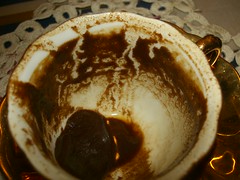

"I hardly drink enough Elliniko to be an expert in it," Ira replied quickly, "I like the fun of it." Ira was smiling, something she did not often do, as she stared into the cup.
"I wish we could sometimes know what the future holds for us." Genie was being whimsical. Her financial dilemmas dominated her mind most of the time; what she would do to receive advance notice of her financial situation next year. She had thought about going to a fortune teller, but the cost was simply prohibitive for her at the time.
"You know something," Ira spoke confidently, "I think this coffee cup is telling me
your future, Genie,
not mine." Ira's studious face brightened up suddenly, smiling full of glee. Her eyes were making quick movements back and ofrth as she surveyed the cup. Genie was slightly startled by her friend's illogical rambling, a woman who had built her whole life on sound reasoning, never overspending her credit card limit, washing dishes by hand to save energy. Among the other staff, she had earned the reputation of a hard liner, which is possibly what had kept her aloof, slightly distanced from her peers. She had shocked the office with her opinion about the evil eye, after having made it abundantly clear in her own astute way that no one can ever
mathisaso her because, in her own words, 'there is no such thing'. The evil eye was one tradition that even the most open-minded locals who had rid themselves fo the shekels of popular culture preferred to maintain, as a convenient cover for their misdemeanours.
"Oh,
you had that coffee," Genie reminded her. "That can't be my life in there," she added, her voice indicating that she did actually hope the coffee cup would bring good tidings for her, even if only as a morale booster.
"Yes, but..." Ira's voice trailed off as she grimaced, bringing her furry eyebrows together. "I'm happily married, and this cup's showing love. Look for yourself. There's a heart-shaped mound of coffee grounds. Θα ερωτευτείς, Genie!" Ira sounded excited, her voice was slowly rising in both tone and pitch.
Genie looked inside the cup. Ira wasn't making itup; the coffee grounds had indeed made the shape of a near-perfect heart. Ira can't have created it herself. The coffee cup had been upturned in the space of a couple of seconds; surely Ira had nothing to do with where the grounds stuck. She was intrigued to find out more, still unsure of whether to take the whole scene seriously.
"So who I am in love with?" she asked.
Ira had not taken her eyes off the cup. "There's a large vacuum of space above the left-hand side of the heart, see here?" She pointed to a white space where the grounds had left very little of their residue. "This probably signifies the period of time that you've spent alone since your relationship broke up." Ira looked up at Genie. "This is your cup, Genie. I never had an in-between relationship period in my lovelife. My husband was the
only one."
This was all too credible for Genie. She now fully understood Ira's relationship with her husband; the poor man was probably scared of his own shadow in her presence. Her mind wandered to her ex, Kosta, the manwho stole her heart, the only one in her eyes, the love of her life. She had still not gotten over his leaving. In any case, she couldn't have left him, since they were living in her house. Despite his monetary shortcomings, Kosta's bedroom antics were unsurpassable, at least in comparison with her former boyfriends in the US. Kosta epitomised the Greek lover she had dreamed about and hoped to find when she first came to Greece.
"Can you see the tree beside the empty space?" Ira pointed to the zig-zag lines branching downwards to the centre of the cup. Θα γίνεις πλούσια! Genie, he's got money!"
It was not unusual to switch between Greek and English in everyday conversation among the ex-patriot community. Most of the time, native English speakers with a Greek background conversed in English, switching to Greek when they couldn't think of the word they wanted. Sometimes the exact meaning couldn't be translated because it reprented a different concept in one or the other language and could not be expressed without sounding over-wordy and explanatory. The idea of 'privacy' was a classic example of a word that did not have a good Greek equivalent, and Ira seemed to have completely forgotten that this conversation was extending beyond the borders of privacy with her booming voice resonating in the near-empty cafe. What would the people around them be thinking? Greek was however a perfect lingusitic choice for reading το φλυτζάνι; it seemed most befitting that Ira should perform this task in the appropriate language, lending her predictions credibility.
Genie's thoughts were interrupted by a chair behind her bumping into the one she was sitting on. She turned round to see if she was in anyone's way and noticed an extra-large woman moving her chair so that she was back to back with Genie, making her feel slightly uncomfortable scrunched up close to the table. Genie moved her chair slightly.
"Τί άλλο, τί άλλο...," Ira was beginning to sound like an experienced cup reader. Had she really not done this before? She was staring intently into the cup, and had now swtitched to speaking Greek to express her predicitons.
"Aaaaah," Ira's voice was sounding a tad too loud, given the atmpsphere of an empty cafe. She could be heard by the counter staff, as well as the next table. "Κρίμα, θά'νε γέρος!"
"Hey, I don't care how old he is," Genie was just beginning to enjoy herself at this point, made apparent by her own language switch to Greek. "Just as long as he's rich!" They both exploded into laughter.
Genie was just about to ask Ira how the age factor of her future lover had shown up in the φλυτζάνι when she heard a scuttling noise coming from behind her, as the chairs from the next table scraped across the tiled floor. Genie pressed her body - mainly her midriff which had the shape of a bulgy spare tire - to the table. The women behind her were getting ready to leave. The overweight woman was hurriedly tossing her possessions into her bag.
They other women were still in the cafe as Ira's voice reached a crescendo with what was to be her final prediction.
"And he's gonna die three years after you marry him" - she was now speaking embarrassingly loudly - "but
you inherit
everything!"
*** *** ***
The fat woman glanced at Ira, who was smiling self-confidently, her face returning to her normal serene level. "
ΣΚΥΛΑ!" she cried, clutching her bag close to her as she raced ahead to catch up with the other woman, who was of course much quicker than herself, being only a third of her weight. Genie watched the scene unfolding before her eyes with a dumbfounded look. She wasn't sure who to look at first: the odd-looking pair of black-clad women racing out of the cafe, the stunned cafe staff, or her friend, who sat motionless, unperturbed by the events that had just unfolded before them.
"Who was that meant for?" Genie finally asked, after what seemed like an hour, but was in fact only a quarter of a minute. "Did you know them?"
Ira kept smiling as she watched the immense posterior of her late father's wife crashing against the chairs as she made her way to the exit with her sister; she had not seen or heard from the woman since her father's death, although word had spread via relatives that her mother had died a few months ago. Ira shrugged her shoulders, shook her head and frowned. "I must have touched a raw nerve somewhere," she said, as Genie stared at her incredulously.
The coffee grounds had now subsided, distorted by whatever moisture had been left in the cup; the storm had passed.
Genie interrupted the brief silence. "So, what exactly do I inherit?" she inquired.
And this one is for Aris, who helped me finish the story.©All Rights Reserved/Organically cooked. No part of this blog may be reproduced and/or copied by any means without prior consent from Maria Verivaki.

 100 years ago, no one knew where Macedonia was, but every one knew Constantinople. Now, you can choose the kind of Macedonia you want to go to (but not on a Greek map), whereas no one can go to Constantinople any more (you've got to go to Istanbul). Uskup was a relatively insignificant part of the Turkish empire. Now, with a slight change of name (Skopje), it's a relatively insignificant part of Europe. Greece was about as big as two Sicilies stuck one on top of each other, and it reached as far as Larissa. Crete was still considered part of the Turkish empire and it had no sure name - it was also labelled Candia. In 1897, Candia - or Crete, as I now know my beloved homeland - had only just managed to free itself from hanging off the dingle-dangles of the Turkish empire.
100 years ago, no one knew where Macedonia was, but every one knew Constantinople. Now, you can choose the kind of Macedonia you want to go to (but not on a Greek map), whereas no one can go to Constantinople any more (you've got to go to Istanbul). Uskup was a relatively insignificant part of the Turkish empire. Now, with a slight change of name (Skopje), it's a relatively insignificant part of Europe. Greece was about as big as two Sicilies stuck one on top of each other, and it reached as far as Larissa. Crete was still considered part of the Turkish empire and it had no sure name - it was also labelled Candia. In 1897, Candia - or Crete, as I now know my beloved homeland - had only just managed to free itself from hanging off the dingle-dangles of the Turkish empire. "But they says that's not necessary, because they wants to build its own pipeline running from Kazakhstan, whose resources they uses, running through Turkey, which would then pass it on to Greece. Which all means, of course, that if we decide to use gas from they's new proposed pipeline, we'd be hanging off both they's and Turkey's dingle-dangles. And they hopes we're going to agree. Paparia!"
"But they says that's not necessary, because they wants to build its own pipeline running from Kazakhstan, whose resources they uses, running through Turkey, which would then pass it on to Greece. Which all means, of course, that if we decide to use gas from they's new proposed pipeline, we'd be hanging off both they's and Turkey's dingle-dangles. And they hopes we're going to agree. Paparia!"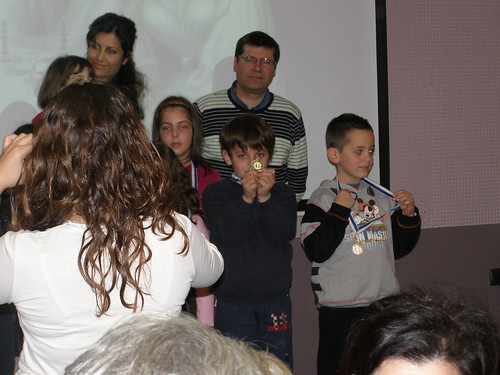
 The first politico to arrive was from the old school of politicians, Mr Skoulakis (a fellow blogger, would you believe). He has the classic Cretan looks with a thick moustache; he looks very much like my dad. His serious but homely manner reminds one of Venizelos, the famous Cretan politician who became the Prime Minister of Greece. Skoulakis entered the room like a gentleman who didn't need any introductions, taking it for granted that everyone knew him, and they did, because he's been in politics longer than I have been alive.
The first politico to arrive was from the old school of politicians, Mr Skoulakis (a fellow blogger, would you believe). He has the classic Cretan looks with a thick moustache; he looks very much like my dad. His serious but homely manner reminds one of Venizelos, the famous Cretan politician who became the Prime Minister of Greece. Skoulakis entered the room like a gentleman who didn't need any introductions, taking it for granted that everyone knew him, and they did, because he's been in politics longer than I have been alive. Next in was Mr Markoyiannakis. Why he's known better as Markoyiannis, without the Cretan name suffix -akis, as one would expect of a Cretan (have you ever noticed my own name?), might have something to do with his blond looks - he definitely doesn't look like my dad. He entered the room shiftily, his furtive gaze showing on his mafia-like fatsa as his eyes darted quickly from one side of the room to the other. He was flanked by two slight looking gentlemen who, despite their short stature, were probably undercover cops with pistols hidden in the right places to be brought out as needed. Mr Markoyiannakis never actually looked at anyone, just straight through them. The icing on the cake was when he excused himself for having to leave the event early. In his own words; "There are a lot of Vasilopites to cut this evening." Shucks man, that guy works so hard.
Next in was Mr Markoyiannakis. Why he's known better as Markoyiannis, without the Cretan name suffix -akis, as one would expect of a Cretan (have you ever noticed my own name?), might have something to do with his blond looks - he definitely doesn't look like my dad. He entered the room shiftily, his furtive gaze showing on his mafia-like fatsa as his eyes darted quickly from one side of the room to the other. He was flanked by two slight looking gentlemen who, despite their short stature, were probably undercover cops with pistols hidden in the right places to be brought out as needed. Mr Markoyiannakis never actually looked at anyone, just straight through them. The icing on the cake was when he excused himself for having to leave the event early. In his own words; "There are a lot of Vasilopites to cut this evening." Shucks man, that guy works so hard. Along comes Karagiozis in the form of Voloudakis. His eyes were large and bright, just like a college freshman's; he's new to the job. It's clearly obvious by the way he kept his hands raised waving to everyone; he looked as though he didn't know anyone in there in the first place. He waved as he entered with his eyes nearly popping out of their sockets, just like a Kewpie doll. He looked like my dad - the young version, of course, minus the moustache; let's face it, it's not so fashionable these days. He carried on like this until the end of his stay at the awards ceremony, exiting in exactly the same fashion as he entered, his hands flapping wildly.
Along comes Karagiozis in the form of Voloudakis. His eyes were large and bright, just like a college freshman's; he's new to the job. It's clearly obvious by the way he kept his hands raised waving to everyone; he looked as though he didn't know anyone in there in the first place. He waved as he entered with his eyes nearly popping out of their sockets, just like a Kewpie doll. He looked like my dad - the young version, of course, minus the moustache; let's face it, it's not so fashionable these days. He carried on like this until the end of his stay at the awards ceremony, exiting in exactly the same fashion as he entered, his hands flapping wildly. What kind of Vasilopita ceremony would it be if we didn't have Santa Claus himself making an appearance? Enter Mr Nikiforakis, Santa Claus minus the podge. He had a jolly look about him; he couldn't stop smiling and laughing. His humour was contagious - we ended up laughing with him too. He kept confusing the derivatives of the word 'skaki' (σκάκι), the Greek word for 'chess', with the word 'skase' (σκάσε), the Greek word for 'shut up'. This guy also looked like my dad (albeit after he had lost a lot of weight due to illness), and yes, he had a moustache. At one point he couldn't stop laughing when he corrected himself after saying 'skaSisitiki' (which meant "something to do with shutting up") when he should have said skaKisitiki (which means "something to do with chess"), which prompted my 8-year-old son to ask me: "Καλά, τρελός είναι αυτός ο άνθρωπος και γελάει τόσο πολύ;" (which basically translates to "Hey, why is that man laughing so much? Is he crazy?"). It is said that if you want the truth, you should ask a child.
What kind of Vasilopita ceremony would it be if we didn't have Santa Claus himself making an appearance? Enter Mr Nikiforakis, Santa Claus minus the podge. He had a jolly look about him; he couldn't stop smiling and laughing. His humour was contagious - we ended up laughing with him too. He kept confusing the derivatives of the word 'skaki' (σκάκι), the Greek word for 'chess', with the word 'skase' (σκάσε), the Greek word for 'shut up'. This guy also looked like my dad (albeit after he had lost a lot of weight due to illness), and yes, he had a moustache. At one point he couldn't stop laughing when he corrected himself after saying 'skaSisitiki' (which meant "something to do with shutting up") when he should have said skaKisitiki (which means "something to do with chess"), which prompted my 8-year-old son to ask me: "Καλά, τρελός είναι αυτός ο άνθρωπος και γελάει τόσο πολύ;" (which basically translates to "Hey, why is that man laughing so much? Is he crazy?"). It is said that if you want the truth, you should ask a child. Yes, don't worry, we've got one of those too. We live in Greece, remember?
Yes, don't worry, we've got one of those too. We live in Greece, remember?